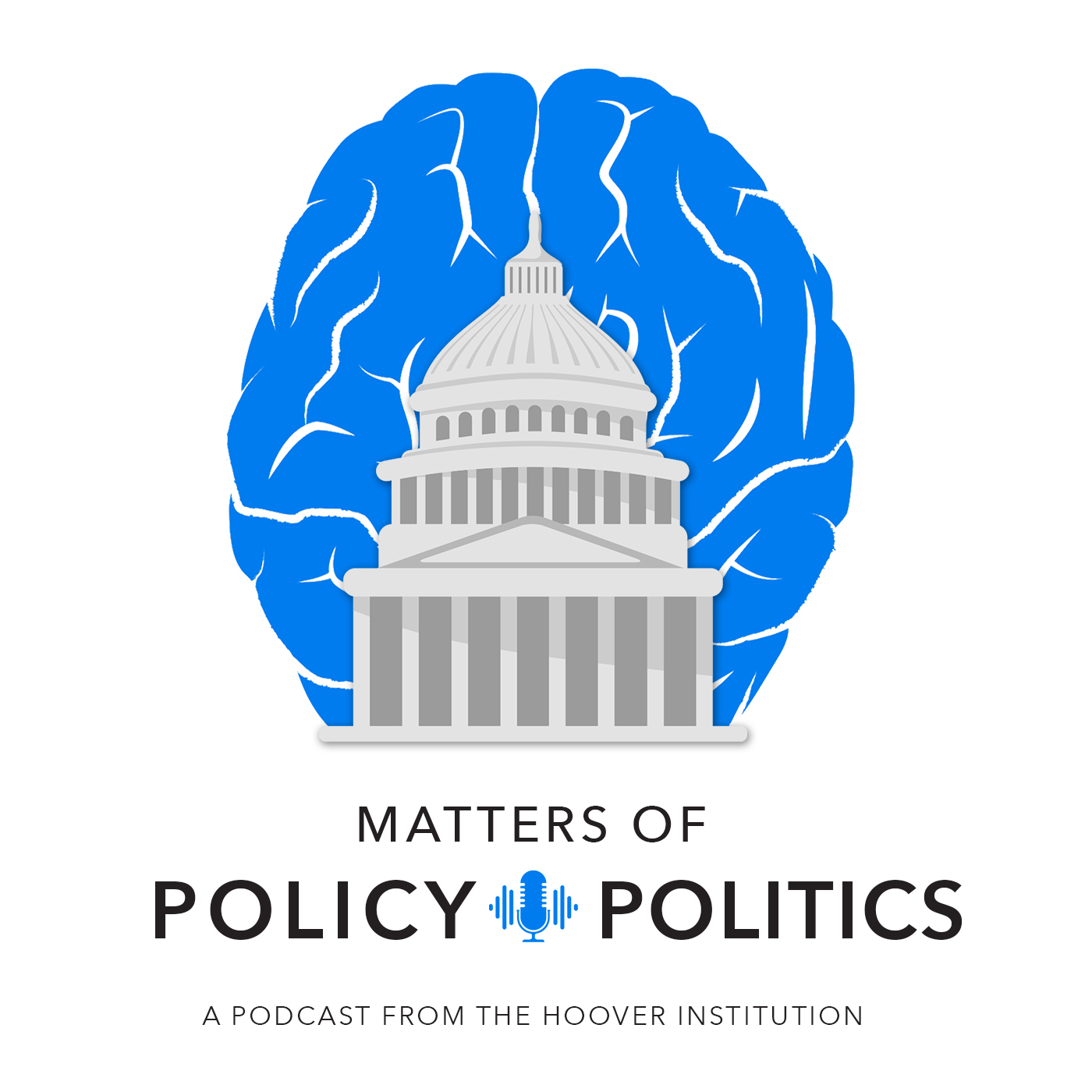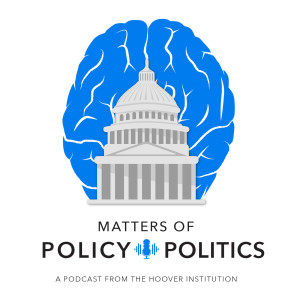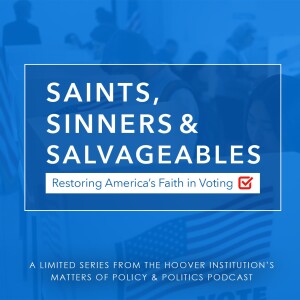
1.8M
Downloads
410
Episodes
Matters of Policy & Politics is a Hoover Institution podcast devoted to matters of governance and balance of power at home and abroad. It is hosted by Hoover fellow Bill Whalen.
Matters of Policy & Politics is a Hoover Institution podcast devoted to matters of governance and balance of power at home and abroad. It is hosted by Hoover fellow Bill Whalen.
Episodes

Thursday Nov 14, 2024
Restoring Confidence in Congress: Will the House Come to Order?
Thursday Nov 14, 2024
Thursday Nov 14, 2024
By most metrics – a 16% job-approval rating, failing to deliver budgets much less conducting itself in a stately manner – the U.S. House of Representatives isn’t living up to the Founding Fathers’ ideals. How to restore the public’s confidence in the ways of Capitol Hill? Brandice Canes-Wrone, the Hoover Institution’s Maurice R. Greenberg senior fellow and the founding director of Hoover’s Center for Revitalizing American Institutions, joins former Illinois congressman and Hoover distinguished fellow Daniel Lipinski to discuss Revitalizing the House: Bipartisan Recommendations on Rules and Process – suggested ways to re-empower House members and committees and restore some semblance of the democratic process.
Recorded on November 12, 2024.

Friday Nov 08, 2024
America Votes – The System Holds | Saints, Sinners, & Salvageables
Friday Nov 08, 2024
Friday Nov 08, 2024
And so the great election meltdown that was supposed to happen didn’t – across America this week, tens of millions of voters going about their business in a seemingly orderly fashion, with a decisive outcome favoring one presidential candidate and his party.
In this, the third of a four-part series on election integrity, Ben Ginsberg, the Hoover Institution’s Volker Distinguished Visiting Fellow and a preeminent authority on election law, joins Hoover distinguished policy fellow Bill Whalen to discuss how voting played out on Election Day in America – results that surprised Ben, how different systems and vote-counting processes held up in battleground states, plus what election reforms a new Congress might want to pursue in 2025 (translation: requiring identification, greater uniformity and addressing non-citizen voting).
Recorded on November 7, 2024

Friday Nov 01, 2024
Friday Nov 01, 2024
What to expect in a California election that shows some prominent big-city incumbents in trouble and an anti-crime ballot measure steamrolling to victory?
As Election Day approaches, Hoover senior fellow Lee Ohanian and distinguished policy fellow Bill Whalen, both contributors to Hoover’s California on Your Mind web channel, join Hoover senior product manager Jonathan Movroydis to discuss the latest in the Golden State including the spectacle of government-envisioned “tiny houses” with not-so-tiny costs. They also discuss what a non-endorsement in the presidential race says about the troubled state of the state’s once-mightiest newspaper, and how Governor Gavin Newsom can move forward in 2025, depending on who becomes America’s 47th president.
Recorded on October 31, 2024.

Tuesday Oct 29, 2024
Close Encounters Of The Coos County Kind | Saints, Sinners, & Salvageables
Tuesday Oct 29, 2024
Tuesday Oct 29, 2024
Justin Grimmer, a Hoover Institution senior fellow and Stanford University political scientist, joins Ben Ginsberg, the Hoover Institution’s Volker Distinguished Visiting Fellow and a preeminent authority on election law, to discuss what the former’s visit to Coos County, Oregon, revealed about trust in the election process and the challenges involved in debunking election-integrity myths. Their suggestions for curbing skepticism: losing candidates admitting defeat, encouraging the public to look “under the hood” at how elections are administered, and encouraging early voting to minimize dramatic vote swings after Election Day. Also discussed: the impact (or lack thereof) of voter-identification laws and reduced early-voting windows on turnout this fall.
Recorded on October 28, 2024

Tuesday Oct 15, 2024
Tuesday Oct 15, 2024
Wednesday, October 16, 2024 - 56 min listen
Hoover Institution | Stanford University
Like a storm headed to America’s shores, the November forecast calls for the sound and fury of a contentious election that challenges the public’s trust in democracy. Ben Ginsberg, the Hoover Institution’s Volker Distinguished Visiting Fellow is a preeminent authority on election law. Ginsberg revives his Saints, Sinners And Salvageables podcast series from two years ago with this kickoff installment examining whether battleground states are better prepared this election cycle than in recent election cycles, plus Ginsberg explores possible legal challenges that might happen before, during, and after the vote-count.
Recorded on October 14, 2024.

Wednesday Oct 09, 2024
Games People Play
Wednesday Oct 09, 2024
Wednesday Oct 09, 2024
Why did the “best and brightest” of the Kennedy and Johnson administrations continue with a flawed Vietnam strategy despite years of wargaming simulations warning that there were no good outcomes for American involvement? Jacquelyn Schneider, the Hoover Institution’s Hargrove Hoover Fellow and director of Hoover’s Wargaming and Crisis Simulation Initiative, discusses the role of the 1960’s “SIGMA Games” in deciding Southeast Asia options, how wargaming influenced America Cold War strategy, its use in making sense of present-day enigmas (China, Russia), plus the challenges in playing out scenarios in the “final frontier” that is outer space.

Wednesday Oct 02, 2024
Bill-Signing Recap – Deep Fakes, Deep Dodges...and Deeply Indebted to an NBA Owner
Wednesday Oct 02, 2024
Wednesday Oct 02, 2024
Who are the winners and losers now that California Governor Gavin Newsom has signed off on hundreds of legislative bills? Hoover senior fellow Lee Ohanian and distinguished policy fellow Bill Whalen, both contributors to Hoover’s California on Your Mind web channel, join Hoover senior product manager Jonathan Movroydis to discuss why the past month in Sacramento was good news for teen-abuse victim Paris Hilton (Newsom signed a bill she championed) and Los Angeles Clipper’s owner Steve Ballmer (his new arena received a late-night alcohol exception); and bad news for Elon Musk (he didn’t get his way on a controversial AI measure as his social-media feud with the governor continues). Possibly the worst news is for Californians fond of direct democracy and election integrity (Newsom vetoed a voter ID requirement). Then, the legislature approved a constitutional amendment altering California’s recall process which voters will decide on in 2026.

Friday Sep 27, 2024
What Polling Says About Trump, Harris And An Election “Doom Loop”
Friday Sep 27, 2024
Friday Sep 27, 2024
Is the current presidential election lining up along the same lines as the past two Trump referenda with a small number of swing states and an even smaller subset of issues (in 2024: jobs, inflation, immigration, and wars) deciding who will become America’s 47th president?
David Brady and Douglas Rivers, Hoover Institution senior fellows and managers of a tracking poll on the US electorate, discuss what’s different in a contest featuring known (Donald Trump) and lesser known (Kamala Harris) entities, what matters most to independent voters, the odds of one or both chambers of Congress flipping, plus whether Pennsylvania is the “new Florida” as ground zero for deciding presidential outcomes.

Tuesday Sep 17, 2024
A (Better) Government for the People: Michael Boskin on the Future of Federalism
Tuesday Sep 17, 2024
Tuesday Sep 17, 2024
Since the founding of the republic, America’s leaders have pondered the question of federalism and the proper divide between national and local government regarding such thorny matters as infrastructure, healthcare financing, and education. Michael Boskin, the Hoover Institution’s Wohlford Family Senior Fellow and former chair of the White House’s Council of Economic Advisers, discusses American Federalism Today: Perspectives on Political and Economic Governance, a newly released book he edited based on the findings from a November 2023 Hoover conference on federalism. Boskin explains the urgent need for policy reforms (government waste in particular), plus what makes for effective government commissions (Boskin chaired a federal commission on the Consumer Price Index in the mid-1990’s).

Tuesday Aug 27, 2024
Tuesday Aug 27, 2024
The Democratic National Convention turns out to be a tale of two Californians – Vice President Kamala Harris becoming her party’s standard-bearer; Governor Gavin Newsom left out of the speakers’ lineup (other than a two-minute cameo during the roll-call vote).
Hoover senior fellow Lee Ohanian and distinguished policy fellow Bill Whalen, both contributors to Hoover’s California on Your Mind web channel, join Hoover senior product manager Jonathan Movroydis to discuss in the Golden State including Harris and Newsom’s reversals of fortune, the Golden State’s struggles with job-retention, plus whether a Harris presidency can succeed where a Newsom governorship seems destined to fail (she wants to build three million new homes nationally in her first term; Newsom is far behind on his downsized goal of 2.5 million new California homes by the decade’s end).
